Direct-to-Consumer brands are taking over, you may have heard of them, or even perhaps are a customer of some of these companies
Compared to a traditional retailer, using a direct to consumer model offers a range of advantages for the business. Prior to the boom of the internet, retail was controlled by distributors. You'd work hard to create your products and you'd then have to show the distributors that it would be beneficial for them to sell your products in their stores.
Doing so would land your shelf space at huge department stores like Target, Asda, John Lewis, Selfridges, etc.
But if you couldn't get placed there, you'd struggle to make any good run of your business. After all, the distributors controlled what was sold in the stores.
This led to a uniform way to get your products in stores. Product creators would stick to a regimented set of standards that met the market's expectations. Distributors would then buy the products from you, set their own prices and start selling them in the stores.
But this all changed once the internet and particularly e-commerce boomed. Companies using a D2C business model were able to cut out the middleman (distributor) and sell directly to their customers.
This model works because the savings they have can be passed onto their customers to reduce the price the customer pays.
Because they're in control of the entire process, they're able to create a much more uniform brand experience throughout the entire customer journey.
In this post, we're going to look at 5 Direct-to-consumer brands to understand what they do and why it's effective.
Away
Luggage company, Away are valued at 1.4$bn. That's a lot of money for some suitcases. But how have they done it and what does it mean for the brand moving forward.
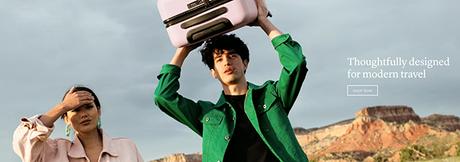
Their tagline, "thoughtfully designed for modern travel" echoes throughout their entire business model. Although their suitcases are on the expensive side, It's easy to see the value they offer with the added features.
With their increased funding, Away plans to expand its current product line for existing categories (luggage). However, that's not all, they want to expand into new product categories like apparel, lifestyle accessories, and wellness. Not only that but they plan to expand their brick-and-mortar experience by opening at least 50 new stores in the coming three years.
Away's success lies in their thoughts for how people are traveling. When they think about the problem they're trying to solve, it goes beyond "we're providing suitcases for people who need luggage".
They're able to charge a higher premium price because of the thought they've put in to the actual issues - making the entire travel journey easier.

Little touches like the ability to charge your devices while on the move shows potential customers that Away understands the issues surrounding the entire traveling process and are determined to build products to address and solve these.
The Honest Company
When a celebrity launches a new company, they have an advantage in that they already have a certain degree of exposure they can show their new products or business to from the first day of launch.
Jessica Alba launched The Honest Company but she didn't try and use her status to win points - although it did help.
Instead, she used her status to evangelize the story of her company. The Honest Company is an 'honest and safe natural baby and beauty company.
Although their messaging and products aren't directly linked to Jessica Alba, they've managed to build a separate brand that acts as a separate entity. However, after a number of product recalls, the company is struggling to bring back their reputation.
The brand has a good story, though. Because Jessica was sick during the pregnancy with her first child, she looked for new products that wouldn't cause her any more reactions. She felt frustrated when she couldn't find any and so she found The Honest Company. This level of branding and story would be hard to portray through a traditional retailer - distribution model.
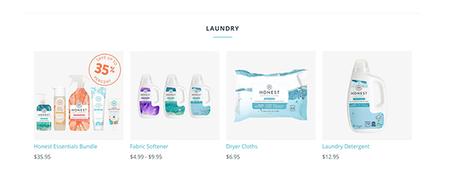
What sets this business apart from other DTC brands is how many initial products they launched with. For many brands, they launch with a small selection to test and validate their ideas. However, The Honest Company launched with 17 different products. There was a good reason for this.
Their business markets to people who care about the ingredients they use within their household goods and make-up. So if they're looking for sensitive baby wipes, they're also probably looking for chemical-free baby powder. If they're unable to buy the products from one place, they'll simply look elsewhere.
Beltology
Who would've thought you could have an entire store dedicated to belts? Well, that's exactly what the founders of Beltology have created. They believe that belts are more than just keeping your trousers held up.
When they first started designing their belts, they tried to focus on creating a product that was more than just a means to an end.
This was all possible through the digital experience they created that helps people identify the perfect belt for the,
And once you've chosen your belt, you have up to 100 days to return your product if for some reason you no longer like it.
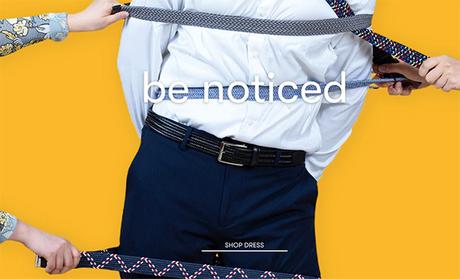
When you land on the homepage, you're prompted with a screen that asks whether you want to be noticed, be colorful or be comfy. They understand that people have different belts for different reasons and once you do finally select what type of belt you're after, you get a better breakdown of the right type of belt for you.
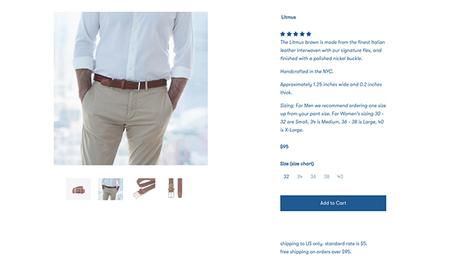
Their useful product image s and product descriptions gives each potential customer a good idea of what they might feel or look like if they were to purchase the belt themselves.
David Kind
Gone are the days where the only way to buy glasses was to go into opticians. Instead, you can now buy your glasses online. David Kind is a premium DTC eyewear company that focuses on matching you with the perfect frame.

How it works is simple. You pick 6 pairs of glasses that you think you'll love. Try them all on at home and then pick the pair or pairs you like. Shipping is free to send to you and free to return back to them. There is also no obligation to buy.
But their digitally forward company means that you're not randomly picking 6 frames you think you'll like. They have a selfie system that helps people figure out how a specific frame would look on your specific face.

BucketFeet
Bucket feet live a sustainable fashion ethos. They sell footwear designed by artists in limited runs. This means they're thinking responsibly about how they create fashion but also with each launch, they're able to release a whole new limited selection of products.
Not only this but they give back to the artists. Any artist who is chosen to work with the company receives an upfront payment as well as royalties for each pair of shoes sold.
This helps consumers buy unique items and helps the artist community stay afloat by paying them a fee before and during the entire process.
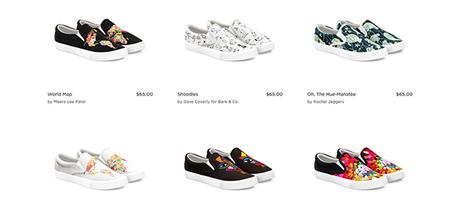
Even though each shoe has a completely different design, they all seem on brand. On the sole of the shoe, they also have the BucketFeet logo and name to ensure a consistent brand even when each product is unique.
Final thoughts
You might have bought from these direct-to-consumer stores before without realizing it. Either way, the online world is allowing brands to take back control in how they brand and sell their products. No longer do they have to rely on solely getting in with a distributor.
We hope these five D2C e-commerce businesses have sparked some interest in this new wave of shopping.
We're going to be posting a lot more content about the world of direct-to-consumer over here at Prisync, so if there are any topics you'd like us to cover, please reach out to us or leave a comment below.

